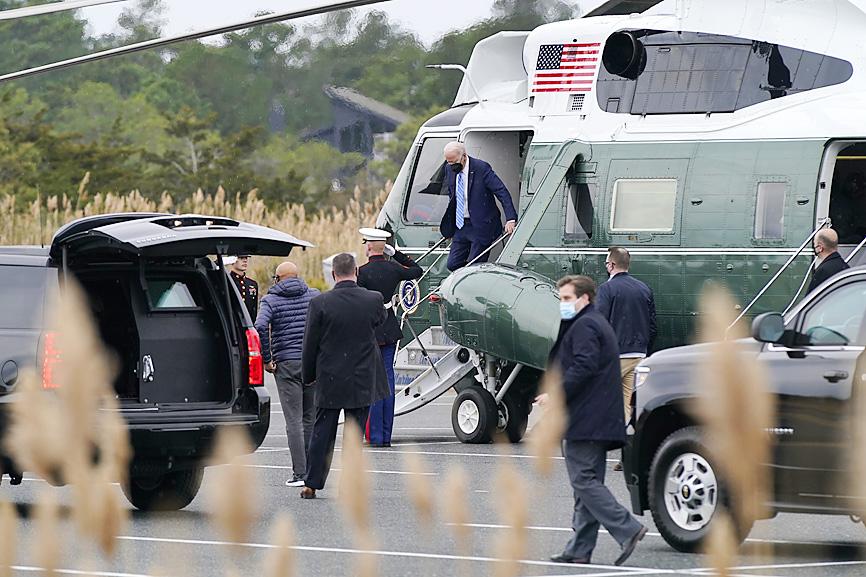The government yesterday thanked the US for reiterating its support for Taiwan’s security after US President Joe Biden on Monday signed the National Defense Authorization Act into law, which advises the US executive branch to invite Taiwan to join the Rim of the Pacific Exercise (RIMPAC) amid a statement of congressional support for the defense of Taiwan.
“The act authorizes fiscal year appropriations principally for the [US] Department of Defense, for Department of Energy national security programs, and for the Department of State,” Biden said in a statement.
Following several rounds of negotiations in the US Congress, the act keeps four articles related to Taiwan, Ministry of Foreign Affairs spokeswoman Joanne Ou (歐江安) told a news briefing in Taipei.

Photo: AP
The US reiterated its commitment to Taiwan’s security, as set forth in the US’ Taiwan Relations Act and the “six assurances,” Ou said.
It supports the US National Guard to cooperate with Taiwan and help Taiwan maintain a sufficient self-defense capability, and advises the US’ executive branch to invite Taiwan to participate in next year’s RIMPAC, she said.
Since Biden’s administration took office in January, it has repeatedly said that its support for Taiwan is “rock solid” while taking concrete action to demonstrate its support, Ou said.
Taiwan would continue to work with the US and other like-minded countries to contribute to peace, stability and prosperity across the Taiwan Strait and the Indo-Pacific region, Presidential Office spokesman Xavier Chang (張惇涵) said in a statement.
Asked if the US’ disagreements with its allies, such as Nicaragua, might affect Taiwan’s ties, Ou said that the nation is responsible for maintaining its own diplomatic relations.
The ministry considers consolidating relations with existing allies and boosting practical partnerships with the US, Japan and other like-minded countries to be equally important, Ou said.
The nation has only 14 diplomatic allies after Nicaragua switched recognition from Taipei to Beijing on Dec. 9.
After ordering Taiwanese diplomats to leave by Thursday last week, the South American country is reportedly trying to transfer Taiwan’s assets to China.
The ministry had sold the building that housed its former mission in Nicaragua to the Archdiocese of Managua at a symbolic price of US$1, based on a contract signed on Wednesday, Ou said.
Regarding the Nicaraguan government’s attempt to illegally expropriate the building and transfer it to Beijing, the government is seeking legal action through international channels, as well as help from other countries, she said.
Taiwanese compatriots and businesspeople in Nicaragua should watch out for their own safety and, if necessary, ask for help from Taiwan’s embassy in Honduras, which has taken over businesses related to Nicaragua, she said.
Additional reporting by AP

Taiwan is gearing up to celebrate the New Year at events across the country, headlined by the annual countdown and Taipei 101 fireworks display at midnight. Many of the events are to be livesteamed online. See below for lineups and links: Taipei Taipei’s New Year’s Party 2026 is to begin at 7pm and run until 1am, with the theme “Sailing to the Future.” South Korean girl group KARA is headlining the concert at Taipei City Hall Plaza, with additional performances by Amber An (安心亞), Nick Chou (周湯豪), hip-hop trio Nine One One (玖壹壹), Bii (畢書盡), girl group Genblue (幻藍小熊) and more. The festivities are to

Auckland rang in 2026 with a downtown fireworks display launched from New Zealand’s tallest structure, Sky Tower, making it the first major city to greet the new year at a celebration dampened by rain, while crowds in Taipei braved the elements to watch Taipei 101’s display. South Pacific countries are the first to bid farewell to 2025. Clocks struck midnight in Auckland, with a population of 1.7 million, 18 hours before the famous ball was to drop in New York’s Times Square. The five-minute display involved 3,500 fireworks launched from the 240m Sky Tower. Smaller community events were canceled across New Zealand’s

The Ministry of Foreign Affairs (MOFA) yesterday said it is closely monitoring developments in Venezuela, and would continue to cooperate with democratic allies and work together for regional and global security, stability, and prosperity. The remarks came after the US on Saturday launched a series of airstrikes in Venezuela and kidnapped Venezuelan President Nicolas Maduro, who was later flown to New York along with his wife. The pair face US charges related to drug trafficking and alleged cooperation with gangs designated as terrorist organizations. Maduro has denied the allegations. The ministry said that it is closely monitoring the political and economic situation

‘SLICING METHOD’: In the event of a blockade, the China Coast Guard would intercept Taiwanese ships while its navy would seek to deter foreign intervention China’s military drills around Taiwan this week signaled potential strategies to cut the nation off from energy supplies and foreign military assistance, a US think tank report said. The Chinese People’s Liberation Army (PLA) conducted what it called “Justice Mission 2025” exercises from Monday to Tuesday in five maritime zones and airspace around Taiwan, calling them a warning to “Taiwanese independence” forces. In a report released on Wednesday, the Institute for the Study of War said the exercises effectively simulated blocking shipping routes to major port cities, including Kaohsiung, Keelung and Hualien. Taiwan would be highly vulnerable under such a blockade, because it